
Auromirta Oro
Ask a doctor about a prescription for Auromirta Oro

How to use Auromirta Oro
Package Leaflet: Information for the Patient
AuroMirta ORO, 15 mg, orodispersible tablets
AuroMirta ORO, 30 mg, orodispersible tablets
AuroMirta ORO, 45 mg, orodispersible tablets
Mirtazapine
Read the package leaflet carefully before taking the medicine, as it contains important information for you.
- Keep this leaflet, you may need to read it again.
- If you have any further questions, ask your doctor or pharmacist.
- This medicine has been prescribed for you only. Do not pass it on to others. It may harm them, even if their symptoms are the same as yours.
- If you experience any side effects, including those not listed in this leaflet, tell your doctor or pharmacist. See section 4.
Contents of the package leaflet:
- 1. What AuroMirta ORO is and what it is used for
- 2. Important information before taking AuroMirta ORO
- 3. How to take AuroMirta ORO
- 4. Possible side effects
- 5. How to store AuroMirta ORO
- 6. Contents of the pack and other information
1. What AuroMirta ORO is and what it is used for
AuroMirta ORO is one of a group of medicines called antidepressants.
AuroMirta ORO is used to treat depression in adults.
It usually takes between 1 and 2 weeks for AuroMirta ORO to start working, and it may take 2 to 4 weeks before you start to feel better. If you do not feel better or feel worse after 2-4 weeks, you should see your doctor immediately. More information can be found in section 3 "When can you expect to feel better".
2. Important information before taking AuroMirta ORO
Do not take AuroMirta ORO - OR - consult your doctor before taking AuroMirta ORO:
- if you are allergic to mirtazapine or any of the other ingredients of this medicine (listed in section 6). If so, you should immediately talk to your doctor before taking AuroMirta ORO.
- if you are taking or have taken (within the last two weeks) medicines called monoamine oxidase inhibitors (MAOIs).
- if you have ever had a severe skin rash or blistering of the skin, peeling of the skin, and (or) sores in the mouth after taking AuroMirta ORO or other medicines.
Be careful when taking AuroMirta ORO:
Severe skin reactions, including Stevens-Johnson syndrome (SJS), toxic epidermal necrolysis (TEN), and drug reaction with eosinophilia and systemic symptoms (DRESS) have been reported with the use of AuroMirta ORO. You should stop taking the medicine and seek medical attention immediately if you experience any of the symptoms listed in section 4.
- 4.
If you have ever had a severe skin reaction, you should not restart treatment with AuroMirta ORO.
Warnings and precautions
Before starting to take AuroMirta ORO, you should discuss this with your doctor or pharmacist.
Children and adolescents
Mirtazapine is not usually given to children and adolescents under 18 years of age, as its safety and effectiveness in this age group have not been established. Additionally, in children under 18 years of age, an increased risk of side effects such as suicidal attempts, suicidal thoughts, and hostility (mainly aggression, oppositional behavior, and anger) has been observed when taking this type of medicine. However, your doctor may prescribe AuroMirta ORO to patients under 18 years of age if they consider it to be in their best interest. If your doctor has prescribed AuroMirta ORO for a patient under 18 years of age and the patient wants to discuss this, they should consult their doctor. You should inform your doctor if any of the above symptoms occur or worsen while the patient under 18 years of age is taking AuroMirta ORO. Furthermore, the long-term safety of AuroMirta ORO concerning growth, maturation, and cognitive and behavioral development in this age group has not yet been established. Additionally, in this age group, significant weight gain has been observed more frequently during treatment with AuroMirta ORO compared to adults.
Suicidal thoughts and worsening of depression
If you are depressed, you may sometimes have thoughts of harming or killing yourself. These thoughts may be increased when you first start taking antidepressants, as these medicines take time to work, usually about two weeks, and sometimes longer.
You may be more likely to:
- have had thoughts of suicide or self-harm before.
- be a young adult. Information from clinical trials has shown an increased risk of suicidal behavior in adults aged less than 25 years with mental health conditions who were treated with an antidepressant.
If you experience any of these symptoms, or if you are concerned, you should contact your doctor or go to the hospital.
It may be helpful to tell a relative or close friend that you are depressed and ask them to read this leaflet. You can also ask them to tell you if they think your depression is getting worse, or if they are worried about changes in your behavior.
You should also be careful when taking AuroMirta ORO:
- if you have or have ever had any of the following conditions: Before taking AuroMirta ORO, you should tell your doctor about the following conditions, if you have not already done so.
- seizures (epilepsy). If seizures occur or become more frequent, you should stop taking AuroMirta ORO and contact your doctor immediately;
- liver disease, including jaundice. If jaundice occurs, you should stop taking AuroMirta ORO and contact your doctor immediately;
- kidney disease;
- heart disease or low blood pressure;
- schizophrenia. If psychotic symptoms, such as paranoid thoughts, become more frequent or severe, you should contact your doctor immediately;
- manic depression (alternating periods of excitement/euphoria and depressed mood). If you feel excessively excited or agitated, you should stop taking AuroMirta ORO and contact your doctor immediately;
- diabetes (you may need to adjust your insulin or other antidiabetic medicines);
- eye diseases, such as increased pressure in the eye (glaucoma);
- difficulty urinating, which may be caused by an enlarged prostate;
- certain types of heart disease that may affect your heart rhythm, recent heart attack, heart failure, or taking certain medicines that may affect your heart rhythm.
- if you experience symptoms of infection, such as unexplained high fever, sore throat, and mouth sores. You should stop taking AuroMirta ORO and consult your doctor for a blood test. In rare cases, these symptoms may be signs of blood cell production disorders in the bone marrow. Although these symptoms are rare, they usually occur within 4-6 weeks of treatment.
- if you are elderly. You may be more sensitive to the side effects of antidepressant medicines.
AuroMirta ORO with other medicines
Tell your doctor or pharmacist about all the medicines you are taking now or have taken recently, and about any medicines you plan to take.
Do not take AuroMirta ORO in combination with:
- monoamine oxidase inhibitors (MAOIs). You should not take AuroMirta ORO for two weeks after stopping MAOIs. If you stop taking AuroMirta ORO, you should not take MAOIs for the next two weeks. Examples of MAOIs are moclobemide, tranylcypromine (both are antidepressants), and selegiline (used in Parkinson's disease).
Be careful when taking AuroMirta ORO in combination with:
- antidepressants, such as SSRIs, venlafaxine, and L-tryptophan or triptans (used to treat migraine), tramadol (a painkiller), linezolid (an antibiotic), lithium (used to treat certain mental health conditions), methylene blue (used to treat high levels of methemoglobin in the blood), and St. John's Wort (Hypericum perforatum) (a herbal remedy for depression). In very rare cases, AuroMirta ORO alone or in combination with these medicines may lead to a condition called serotonin syndrome. Some symptoms of this syndrome are: unexplained fever, sweating, rapid heartbeat, diarrhea, (uncontrolled) muscle contractions, shivering, overactive reflexes, restlessness, mood changes, and loss of consciousness. If you experience a combination of these symptoms, you should contact your doctor immediately.
- nefazodone, an antidepressant. It may increase the amount of AuroMirta ORO in your blood. You should tell your doctor if you are taking this medicine. It may be necessary to reduce the dose of AuroMirta ORO or, if nefazodone is stopped, to increase the dose of AuroMirta ORO again.
- anxiolytics or hypnotics, such as benzodiazepines.
- medicines used to treat schizophrenia, such as olanzapine.
- antihistamines, such as cetirizine.
- strong painkillers, such as morphine. In combination with these medicines, AuroMirta ORO may increase the sedation caused by these medicines.
- antibiotics; medicines used to treat bacterial infections (such as erythromycin), medicines used to treat fungal infections (such as ketoconazole), and medicines used to treat HIV/AIDS (such as protease inhibitors) and medicines used to treat stomach ulcers (such as cimetidine).
In combination with AuroMirta ORO, these medicines may increase the level of AuroMirta ORO in your blood. You should tell your doctor if you are taking these medicines. It may be necessary to reduce the dose of AuroMirta ORO or, after stopping these medicines, to increase the dose of AuroMirta ORO again.
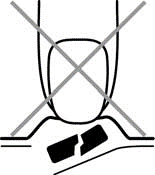
- antiepileptic medicines, such as carbamazepine and phenytoin.
- antituberculosis medicines, such as rifampicin. In combination with AuroMirta ORO, these medicines may decrease the level of AuroMirta ORO in your blood. You should tell your doctor if you are taking these medicines. It may be necessary to increase the dose of AuroMirta ORO or, after stopping these medicines, to decrease the dose of AuroMirta ORO again.
- medicines that prevent blood clotting, such as warfarin. AuroMirta ORO may increase the effect of warfarin. You should tell your doctor if you are taking this medicine. If taken together, your doctor should closely monitor your blood parameters.
- medicines that may affect your heart rhythm, such as certain antibiotics and certain antipsychotic medicines.
AuroMirta ORO with food and drink
You may feel drowsy if you drink alcohol while taking AuroMirta ORO.
Do not drink alcohol.
AuroMirta ORO can be taken with or without food.
Pregnancy and breastfeeding
If you are pregnant or breastfeeding, think you may be pregnant, or are planning to have a baby, ask your doctor or pharmacist for advice before taking this medicine.
Limited experience with AuroMirta ORO in pregnant women does not indicate an increased risk. However, caution should be exercised when taking during pregnancy.
If AuroMirta ORO is taken up to the time of delivery or shortly before, the baby should be monitored for possible side effects.
Taking AuroMirta ORO during pregnancy, like other similar medicines (SSRIs), may increase the risk of a serious condition in newborns called persistent pulmonary hypertension of the newborn (PPHN), causing the baby to breathe faster and appear blue. These symptoms usually appear within the first 24 hours after birth. In such a case, you should contact the midwife and/or doctor immediately.
Driving and using machines
Mirtazapine may affect your concentration or attention. Before driving or operating machinery, make sure it does not affect these abilities. If your doctor has prescribed AuroMirta ORO for a patient under 18 years of age, make sure before driving (e.g., a bicycle) that the medicine does not affect concentration and attention on the road.
AuroMirta ORO contains aspartame, a source of phenylalanine. It may be harmful to people with phenylketonuria.This is a rare genetic disorder in which phenylalanine accumulates in the body due to its improper elimination.
3. How to take AuroMirta ORO
This medicine should always be taken exactly as your doctor has told you. If you are not sure, ask your doctor or pharmacist.
Recommended dose
The usual starting dose is 15 mg or 30 mg once a day. Your doctor may advise you to increase the dose after a few days to the amount that is best for you (from 15 mg to 45 mg once a day). The dose is usually the same for all age groups. However, if you are elderly or have kidney or liver disease, your doctor may adjust the dose.
When to take AuroMirta ORO
AuroMirta ORO should be taken once a day, at the same time every day.
It is best to take AuroMirta ORO as a single dose before going to bed. However, your doctor may advise you to divide the dose of AuroMirta ORO - once in the morning and once in the evening before going to bed.
The higher dose should be taken before going to bed.
Orodispersible tablets should be taken as follows:
Tablets should be taken orally.
1. Do not crush the orodispersible tablet
To avoid crushing the orodispersible tablet, do not press on the blister (Figure A).

Figure A
2. Tear off one tablet blister
Each blister contains six pockets, which are separated by perforations. Tear off one pocket containing a tablet along the broken lines (fig. 1).
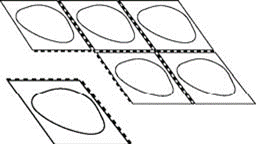
Fig. 1
3. Open the packaging
Carefully peel off the foil, starting from the corner, as indicated by the arrow (fig. 2 and 3)
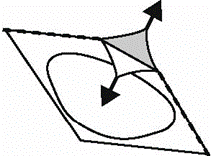
Fig. 2
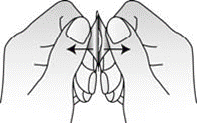
Fig. 3
4. Remove the orodispersible tablet
Remove the orodispersible tablet with dry hands and place it on your tongue (fig. 4).
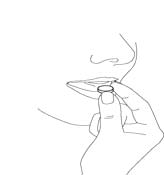
Fig. 4
The tablet dissolves quickly and can be swallowed without water.
When can you expect to feel better?
AuroMirta ORO usually starts working within 1 to 2 weeks, and after 2 to 4 weeks, you may start to feel better. It is essential to talk to your doctor about the effect of AuroMirta ORO within the first few weeks of treatment:
2-4 weeks after starting AuroMirta ORO, you should discuss its effect with your doctor:
If you do not feel better, your doctor may prescribe a higher dose. In such a case, you should talk to your doctor again after another 2-4 weeks. AuroMirta ORO is usually taken for 4 to 6 months, until the symptoms of depression disappear.
Taking more AuroMirta ORO than prescribed.
If you or someone else has taken too much AuroMirta ORO, you should contact your doctor immediately. The most likely symptoms of AuroMirta ORO overdose (without other medicines or alcohol) are drowsiness, disorientation, and rapid heartbeat. Possible symptoms of overdose may include changes in heart rate (fast, irregular heartbeat) and (or) fainting, which can be symptoms of a life-threatening condition called torsades de pointes.
Missing a dose of AuroMirta ORO
If you are supposed to take a dose once a day
- Do not take a double dose to make up for a forgotten dose. Take the next dose at the usual time.
If you are supposed to take a dose twice a day
- If you forget to take the morning dose, take it together with the evening dose.
- If you forget to take the evening dose, do not take it with the next morning dose; skip it and continue with your normal doses in the morning and evening.
- If you forget to take both doses, do not take the missed doses. Skip them and continue with your normal schedule the next day, with doses in the morning and evening.
Stopping treatment with AuroMirta ORO
You should stop taking AuroMirta ORO after consulting your doctor.
If you stop taking AuroMirta ORO too early, your depression may return. When you feel better, you should talk to your doctor. Your doctor will decide when you can stop treatment.
Do not stop taking AuroMirta ORO suddenly, even if your depression has lifted. If you stop taking AuroMirta ORO suddenly, you may experience nausea, dizziness, restlessness or anxiety, and headaches.
These symptoms can be avoided by gradually stopping the treatment. Your doctor will tell you how to gradually reduce the dose.
If you have any further questions about taking this medicine, you should ask your doctor or pharmacist.
4. Possible side effects
Like all medicines, AuroMirta ORO can cause side effects, although not everybody gets them.
If you experience any of the following serious side effects, stop taking AuroMirta ORO and contact your doctor immediately:
Uncommon(may affect up to 1 in 100 people):
- feeling excited or emotionally unstable (mania).
Rare(may affect up to 1 in 1,000 people):
- yellowing of the eyes or skin; this may indicate liver problems (jaundice).
Unknown(frequency cannot be estimated from the available data):
- infection symptoms, such as sudden unexplained high fever, sore throat, and mouth sores (agranulocytosis). In rare cases, mirtazapine may cause blood cell production disorders in the bone marrow. Some people become less resistant to infections because mirtazapine can cause a temporary lack of white blood cells (granulocytopenia). In rare cases, mirtazapine may also cause a lack of red and white blood cells, as well as platelets (aplastic anemia), a lack of platelets (thrombocytopenia), or an increase in white blood cells (eosinophilia);
- seizures (convulsions);
- a combination of symptoms such as unexplained fever, sweating, rapid heartbeat, diarrhea, (uncontrolled) muscle contractions, shivering, overactive reflexes, restlessness, mood changes, and loss of consciousness. In very rare cases, these may be symptoms of serotonin syndrome;
- thoughts of self-harm or suicide;
- red spots on the torso in a target shape or round, often with blisters in the center, peeling of the skin, and sores in the mouth, throat, nose, genitals, and eyes. The occurrence of such serious skin rashes may be preceded by fever and flu-like symptoms (Stevens-Johnson syndrome, toxic epidermal necrolysis);
- widespread rash, high body temperature, and swollen lymph nodes (DRESS syndrome or drug hypersensitivity syndrome).
Other possible side effects of mirtazapine are:
Very common(may affect more than 1 in 10 people):
- increased appetite and weight gain;
- feeling drowsy or sleepy;
- headache;
- dry mouth.
Common(may affect up to 1 in 10 people):
- lethargy;
- dizziness;
- tremors;
- nausea;
- diarrhea;
- vomiting;
- constipation;
- rash or pustular rash;
- joint pain (arthralgia) or muscle pain (myalgia);
- back pain;
- dizziness or fainting when standing up (orthostatic hypotension);
- swelling (usually in the ankles or feet) due to fluid retention (edema);
- fatigue;
- intense dreams;
- confusion;
- feeling anxious;
- sleep problems;
- memory problems, which in most cases disappeared after stopping treatment.
Uncommon(may affect up to 1 in 100 people):
- abnormal sensation on the skin, e.g., burning, tingling, prickling, or itching (paresthesia);
- restless legs;
- fainting;
- numbness in the mouth (oral hypoesthesia);
- low blood pressure;
- nightmares;
- feeling agitated;
- hallucinations;
- feeling the need to move.
Rare(may affect up to 1 in 1,000 people):
- muscle twitching or contractions (myoclonus);
- aggression;
- abdominal pain and nausea: this may indicate pancreatitis.
Unknown(frequency cannot be estimated from the available data):
- abnormal sensations in the mouth (oral paresthesia);
- swelling of the mouth;
- swelling all over the body (generalized edema);
- localized swelling;
- hyponatremia;
- inappropriate antidiuretic hormone secretion;
- severe skin reactions (bullous dermatitis, erythema multiforme);
- sleepwalking (somnambulism);
- speech disorders;
- increased creatine kinase levels in the blood;
- difficulty urinating (urinary retention);
- muscle pain, stiffness, and (or) weakness, darkening or discoloration of urine (rhabdomyolysis).
Additional side effects in children and adolescents
In children under 18 years of age, the following side effects have been commonly observed in clinical trials: significant weight gain, itchy skin rash (hives), and increased triglyceride levels in the blood.
Reporting side effects
If you experience any side effects, including those not listed in this leaflet, you should tell your doctor or pharmacist. Side effects can be reported directly to the Department of Drug Safety Monitoring, Office for Registration of Medicinal Products, Medical Devices, and Biocidal Products, Al. Jerozolimskie 181C, 02-222 Warsaw, tel.: +48 22 49 21 301, fax: +48 22 49 21 309, website: https://smz.ezdrowie.gov.pl
Side effects can also be reported to the marketing authorization holder.
By reporting side effects, you can help provide more information on the safety of this medicine.
5. How to store AuroMirta ORO
Keep out of the sight and reach of children.
Do not use this medicine after the expiry date stated on the packaging and blister after "EXP". The expiry date refers to the last day of the month.
There are no special storage instructions for this medicine.
Medicines should not be disposed of via wastewater or household waste. Ask your pharmacist how to dispose of medicines no longer required. This will help protect the environment.
6. Contents of the pack and other information
What AuroMirta ORO contains
- Each orodispersible tablet contains 15 mg of mirtazapine. Each orodispersible tablet contains 30 mg of mirtazapine. Each orodispersible tablet contains 45 mg of mirtazapine.
- The other ingredients are: crospovidone (type B), mannitol, microcrystalline cellulose, aspartame, colloidal anhydrous silica, magnesium stearate, strawberry-guarana flavor (maltodextrin, propylene glycol, artificial flavorings, and acetic acid) and peppermint flavor (artificial flavorings, cornstarch).
What AuroMirta ORO looks like and contents of the pack
AuroMirta ORO, 15 mg, orodispersible tablets
White, round orodispersible tablets with "36" engraved on one side and "A" on the other side, and a round edge.
AuroMirta ORO, 30 mg, orodispersible tablets
White, round orodispersible tablets with "37" engraved on one side and "A" on the other side, and a round edge.
AuroMirta ORO, 45 mg, orodispersible tablets
White, round orodispersible tablets with "38" engraved on one side and "A" on the other side, and a round edge.
Singles dose blisters of polyamide/Aluminum/PVC/Paper/Polyester/Aluminum, in a cardboard box.
Pack sizes:
15 mg:6 x 1 and 30 x 1 orodispersible tablet.
30 mg and 45 mg:30 x 1 orodispersible tablet.
Not all pack sizes may be marketed.
Marketing authorization holder and manufacturer
Marketing authorization holder:
Aurovitas Pharma Polska Sp. z o.o.
ul. Sokratesa 13D lokal 27
01-909 Warsaw
Manufacturer/Importer:
APL Swift Services (Malta) Ltd.
HF26, Hal Far Industrial Estate, Hal Far
Birzebbugia, BBG 3000
Malta
Generis Farmacêutica, S.A.
Rua João De Deus 19, Venda Nova
2700-487 Amadora
Portugal
This medicine is authorized in the Member States of the European Economic Area under the following names:
Czech Republic:
Mirtazapine Aurovitas
Malta:
Mirtazapine Aurobindo 15 mg/ 30 mg/ 45 mg orodispersible tablets
Poland:
AuroMirta ORO
Spain:
MIRTAZAPINA AUROVITAS 15 mg/ 30 mg/ 45 mg orodispersible tablets
Portugal:
Mirtazapina Aurovitas
Date of last revision of the leaflet: 12/2021
- Country of registration
- Active substance
- Prescription requiredYes
- Manufacturer
- ImporterAPL Swift Services (Malta) Ltd. Generis Farmacêutica, S.A.
- This information is for reference only and does not constitute medical advice. Always consult a licensed doctor before taking any medication. Oladoctor is not responsible for medical decisions based on this content.
- Alternatives to Auromirta OroDosage form: Tablets, 30 mgActive substance: mirtazapinePrescription requiredDosage form: Tablets, 45 mgActive substance: mirtazapinePrescription requiredDosage form: Tablets, 15 mgActive substance: mirtazapinePrescription required
Alternatives to Auromirta Oro in other countries
The best alternatives with the same active ingredient and therapeutic effect.
Alternative to Auromirta Oro in Spain
Alternative to Auromirta Oro in Ukraine
Online doctors for Auromirta Oro
Discuss dosage, side effects, interactions, contraindications, and prescription renewal for Auromirta Oro – subject to medical assessment and local rules.









